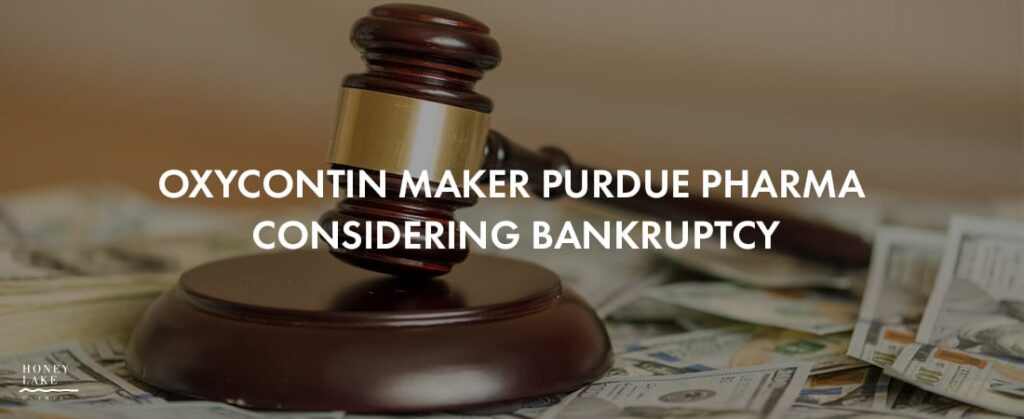Oxycontin Maker Purdue Pharma Considering Bankruptcy
The company that has made billions selling the prescription painkiller OxyContin is considering all legal options, including bankruptcy, a move that could affect hundreds of lawsuits claiming the company played a major role in causing the U.S. opioid drug crisis.
Purdue Pharma’s chief executive said the company is considering bankruptcy as it faces a “cascade of lawsuits” alleging the drug maker played a key role in driving the nation’s opioid crisis, including aggressively and deceptively marketing the powerful painkiller OxyContin.
If you’re ready to leave opioid addiction behind for good, we can help! Our staff is standing by to answer any questions you might have about drug abuse, addiction, or treatment. Call and speak with someone confidentially right now at (844) 747-7772.
See You in Court
Lawsuits accuse the Stamford, Connecticut-based company and its owners, the Sackler family, of downplaying the risks of addiction to OxyContin while exaggerating its benefits. Prosecutors say the company’s marketing practices encouraged doctors to push higher doses of the narcotic and contributed to the public health crisis resulting in thousands of overdoses in the U.S. each year.
Since OxyContin, a time-released opioid, was introduced in 1996, addiction and overdoses to opioids have surged. In 2017, opioids were involved in nearly 48,000 deaths—a record, according to the U.S. Centers for Disease Control and Prevention.
Purdue Pharma, for their part, have denied the allegations and are mounting a vigorous defense. They’ve argued they control just 2 to 3 percent of the overall market for opioid drugs. They contend they are not responsible for overdose deaths from heroin and illicit fentanyl, a powerful synthetic opioid that has killed tens of thousands of people in recent years and is now the leading driver of overdose deaths. They’ve also announced they’re developing a drug to reverse opioid overdoses, which they claim will be far more powerful than naloxone, the well-known opioid antidote currently in use across the country.
With the first trial dates looming, bankruptcy proceedings would likely halt that litigation.
And there is precedent for it. Companies facing big lawsuits which would result in their having to pay out enormous settlements have sought bankruptcy protection before, most recently USA Gymnastics in the wake of the sexual abuse scandal and Pacific Gas and Electric Corp. after wildfires in California.
Opioid Abuse … and You
Courts, lawyers, and legal wrangling will have to sort out responsibility and compensation. What we need to contend with are these realities:
- Roughly 21 to 29 percent of patients prescribed opioids for chronic pain misuse them.
- Between 8 and 12 percent develop an opioid use disorder.
- An estimated 4 to 6 percent who misuse prescription opioids transition to heroin.
- About 80 percent of people who use heroin first misused prescription opioids.
- Opioid overdoses increased 30 percent from July 2016 through September 2017 in 52 areas in 45 states.
- The Midwestern region saw opioid overdoses increase 70 percent from July 2016 through September 2017.
- Opioid overdoses in large cities increase by 54 percent in 16 states.
- 130 people die each day in the U.S. to opioid overdose.
Substance Abuse is Always About More than the Substance
It is especially important to realize substance abuse doesn’t just occur in a vacuum. Often the abuse begins as an attempt to self-medicate a deeper hurt. For real healing and recovery, the underlying causes of substance abuse must be addressed. And this is vitally important when you’re choosing a treatment program or facility.
To get at this underlying hurt and bring lasting healing takes a holistic—spirit, mind and body—approach to addiction diagnosis, management and treatment.
Many programs focus narrowly on what can be addressed from a medical perspective. Research, however, continues to show us that spirituality positively influences recovery in many ways. Although this is well known, and medical and behavioral health professionals have been saying addictions are holistic illnesses that need holistic treatment, the majority of programs still refuse to look to God in the healing process.
Different from many other treatment facilities, Honey Lake Clinic offers a residential, holistic program which treats each client on three different levels:
- Spiritual: Helping you grow closer to God, apply His truths, and discern His will for you.
- Psychological: Teaching decision-making skills to help you cope with underlying struggles.
- Physical: Using therapy and medication, if needed, to re-circuit or renew your mind.
At Honey Lake Clinic, our experienced doctors and staff will help you or your loved one bring spiritual power and clearer psychological understanding to recovery.
